Top 8 Best Online Human Factors (Security) Courses
The study of how humans utilize technology is known as human factors (HF). It covers how human talents, expectations, and constraints interact with work ... read more...settings and system design. The application of human factors concepts to the design of devices and systems is referred to as "human factors engineering" (HFE). Thus, to satisfy the burgeoning demand for online yet qualifying courses, Toplist has compiled a rundown of the Best Online Human Factors (Security) Courses for those in need.
-
Good system management not only requires managing the systems themselves, but requires careful planning to make systems interact with each other, auditing of the systems once they are built, and proactive maintenance of all systems. Organizations also rely on organizational policies, such as Acceptable Use Policies, to bolster the technical aspect of system management. One of the Best Online Human Factors (Security) Courses is Planning, Auditing and Maintaining Enterprise Systems.
This course explores many of the behind the scenes requirements of good system management. The first half of the course covers how to build security into system management process and the organization policies necessary for any enterprise to follow. The latter half of the course focuses on auditing and maintenance of systems once they have been designed, and implemented. You should be able to create and construct organizational policies based on a set of needs, audit a system based on those requirements, and ensure that systems comply to the set of requirements technically by the conclusion of the course.This course offers:
- Flexible deadlines
- Shareable certificate: Get a Certificate when you complete
- 100% online
- Course 4 of 4 in the Spécialisation Computer Security and System Management
- Intermediate level
- Approx. 12 hours to complete
- Subtitles: Arabic, French, Portuguese (European), Italian, Vietnamese, German, Russian, English, Spanish
Rating: 4.7/5
Enroll here: https://www.coursera.org/learn/planning-auditing-maintaining-enterprise-systems

coursera.org 
coursera.org -
Every member of an organization's personnel plays a critical role in fighting against cyber attacks, which is why security is so important. Implementing a company-wide security-awareness training campaign is one of the finest strategies to defend the firm. Security Awareness Training is one of the Best Online Human Factors (Security) Courses. This course is a comprehensive security awareness training program that covers a wide range of issues for users of all types and levels of knowledge. The content is intended to enable enterprises to conduct a complete training program to aid in the protection of their information assets against attacks.
This 2-hour course is meant to be interesting and is based on real-life circumstances that employees may encounter. The training is modular, so you don't have to do it all at once. Topics included in this course are as follows:
- Importance of Security
- Data and Account Security
- Passwords
- Networking and Mobile Security
- Malware
- Social Engineering
This course offers:
- Flexible deadlines
- 100% online
- Beginner level
- Approx. 2 hours to complete
- Subtitles: French, Portuguese (European), Russian, English, Spanish
Rating: 4.6/5
Enroll here: https://www.coursera.org/learn/security-awareness-training
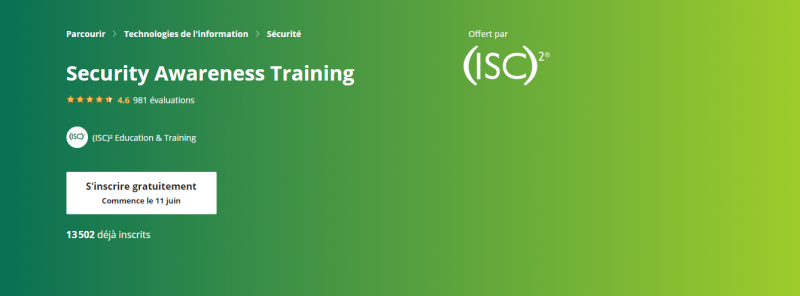
coursera.org 
coursera.org -
Cybersecurity is a necessary business skill in today's workplace. For-profit enterprises, government agencies, and non-profit organizations all require information technology security specialists that are technologically adept and business-savvy. This Specialization will teach you about a range of policies, education and training, and technological best practices for protecting corporate assets. You'll get a better understanding of the dangers and cyber threats or assaults that come with modern information use, as well as the critical technical and management subjects needed for a balanced approach to information security. Mobility, the Internet of Things, the human dimension, governance, and management methods will all be discussed.
If you want to move into a management position in cybersecurity and mobility, this course is for you. Through conversations with industry professionals in this field, you'll be able to study the developments driving the fast spread of information technology and how they bring new difficulties for data protection. Mobile gadgets, for example, provide convenience while also circumventing established security procedures. After completing this course, you will be able to define how the danger grows as criminals use a growing variety of sophisticated tools to exploit our growing reliance on networks for crucial data exchange.
This course offers:
- Shareable certificate: Get a Certificate when you complete
- 100% online courses
- Flexible schedule
- Beginner level
- Approximately 5 months to complete (Recommended pace of 3 hours/week)
- Subtitles: English, Arabic, French, Portuguese (European), Italian, Vietnamese, German, Russian, Spanish, Urdu
Rating: 4.6/5
Enroll here: https://www.coursera.org/specializations/cybersecurity-developing-program-for-business
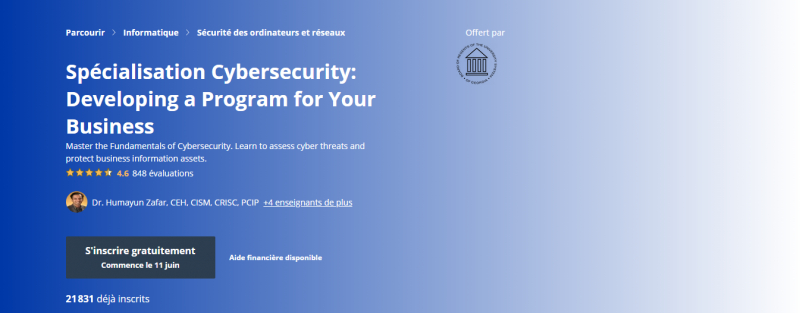
proteksupport.com 
proteksupport.com -
What is the X-Factor, and how does it work? The X-Factor in cybersecurity refers to unexpected and unpredictable human behavior both inside and outside your business. Because "no one truly knows why humans do what they do," (David K. Reynolds), companies may be unprepared for intentional, inexperienced, or even well-intentioned conduct that can create worry and, in some cases, irreversible harm. Cybersecurity and the X-Factor is one of the Best Online Human Factors (Security) Courses.
This course will introduce you to the many forms of training available to mitigate the X-influence, Factor's assess its success, and examine the Security Education, Training, and Awareness (SETA) program, as well as why it may fail. The course will finish with knowledge that will help you with some key aspects of your company's security program. Your knowledge foundation will be rounded out with activities centered on hactivism, cyberinsurance, and ransomware. To keep you engaged in this fascinating topic, your teachers have planned a series of readings, discussions, guest lectures, and exams.
This course offers:
- Flexible deadlines
- Shareable certificate: Get a Certificate when you complete
- 100% online
- Course 3 of 4 in the Spécialisation Cybersecurity: Developing a Program for Your Business
- Beginner level
- Approx. 12 hours to complete
- Subtitles: Arabic, French, Portuguese (European), Italian, Vietnamese, German, Russian, English, Spanish
Rating:4.6/5
Enroll here: https://www.coursera.org/learn/cybersecurity-and-x-factor
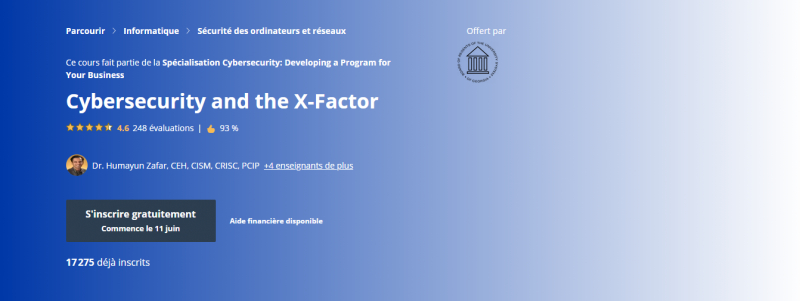
kcl.ac.uk 
kcl.ac.uk -
The course "Cybersecurity in Healthcare" was created to increase knowledge and understanding of the importance of cybersecurity in healthcare (e.g., hospitals, care centers, clinics, and other medical or social care institutions and service organizations), as well as the issues that it faces, which is one of the Best Online Human Factors (Security) Courses. We will cover both theoretical and practical elements of cybersecurity in this course. We consider both the social and technical sides of the situation. We also provide useful information that addresses many elements of cybersecurity. Even if you are not in the healthcare industry, you will discover useful advice and insights for dealing with cybersecurity issues in any other organization or in personal situations.
This course begins with an overview of the potential and difficulties that have arisen as a result of the digitalization of healthcare services. It illustrates how the advancement of technology and the abundance of (medical) data have made hackers a desirable target, which is vital in comprehending why effective cybersecurity measures are critical in the healthcare sector. The course curriculum covers dangers both inside and outside of healthcare organizations, such as social engineering and hacking, in later courses. Module 4 on Cyber Hygiene discusses practical approaches to strengthen cybersecurity inside healthcare organizations. Module 5 delves deeper into how organizational culture influences cybersecurity, concentrating on the interaction of human behavior and technology, as well as how organizational variables may increase or decrease the degree of cybersecurity in healthcare.
What you will learn:
- You'll learn about the importance of digitalization and cybersecurity in the healthcare industry.
- You'll learn about the potential and challenges that digitalization and the abundance of (medical) data pose to the healthcare sector.
- You'll learn about several approaches to enhancing and maintaining cybersecurity, with a focus on the interplay between technology and human behavior.
- You'll learn how a positive cybersecurity culture has a significant impact on an organization's cybersecurity.
This course offers:
- Flexible deadlines
- Shareable certificate:Get a Certificate when you complete
- 100% online
- Beginner level
- Approx. 3 p.m. to complete
- Subtitles: French, Portuguese (European), Russian, English, Spanish
Rating: 4.6/5
Enroll here: https://www.coursera.org/learn/cybersecurity-in-healthcare
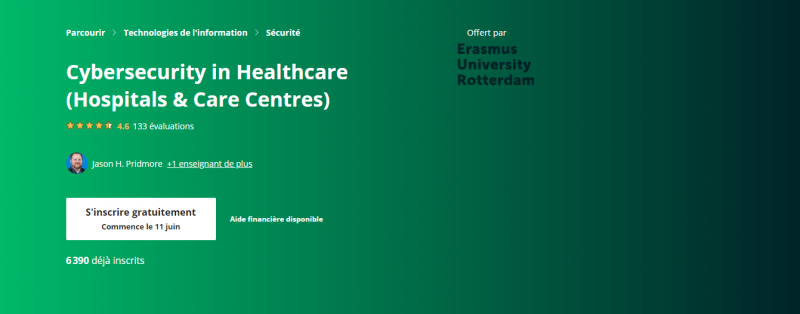
coursera.org 
coursera.org -
This course is also available for academic credit as ECEA 5385, which is part of the Master of Science in Electrical Engineering program at CU Boulder. Developing the industrial infrastructure of the future is a major undertaking. The Industrial Internet of Things (IIoT), also known as Industry 4.0, goes beyond the hoopla of consumer IoT to emphasize a far larger field for possible embedded system applications and growth. "IoT as a whole is a $19 trillion industry," Cisco CEO John Chambers said. Digital oilfield, advanced manufacturing, power grid automation, and smart cities are all examples of IIoT subsets."
This is the first installment of the speciality. The main goal of this specialty is to look at new markets, technology developments, applications, and skills needed by both students and professional engineers interested in careers in the IIoT field. The course's format is purposefully broad and shallow: course will cover a wide range of subjects while without delving too deeply into any one, resulting in a comprehensive overview of the vast IIoT ecosystem. There is one exception: because security is the most critical issue for any "Internet of Things" product development, we shall explore it in depth.
What you will learn:- What Industry 4.0 is and what factors have enabled the IIoT.
- Key skills to develop to be employed in the IIoT space.
- What platforms are, and also market information on Software and Services.
- What the top application areas are (examples include manufacturing and oil & gas).
This course offers:
- Flexible deadlines
- Shareable certificate: Get a Certificate when you complete
- 100% online
- Course 1 of 3 in the Spécialisation Developing Industrial Internet of Things
- Intermediate level
- Approx. 10 p.m. to finish
- Subtitles: Arabic, French, Portuguese (European), Italian, Vietnamese, Korean, German, Russian, English, Spanish
Rating: 4.6/5
Enroll here: https://www.coursera.org/learn/industrial-iot-markets-security

coursera.org 
coursera.org -
Cyber wars are, by definition, an international issue that cuts across national borders. By the conclusion of the course, you will be able to apply what you've learned to analyze and manage international cyber events and conflicts, as well as tasks like developing cybercrime and cyberwarfare policy. Cyber incident and conflict management necessitates an interdisciplinary approach that takes into account: 1) the features of cyber threats and conflicts, 2) worldwide efforts to minimize and enhance cyber security, and 3) psychological and sociopolitical elements.
The course is aimed at an international audience, and it will encourage participants to debate current events in order to enrich the experience with a variety of personal and cultural viewpoints on pressing topics. In addition, to ensure that the content is applied, assignments and other evaluations will be used to augment video lectures and selected readings. Following completion of this course, you will be able to:
- Recognize the many sorts of players involved in cyber-threats (individuals, organizations, & nation-states).
- Differentiate between several forms of cyber security risks and challenges, such as data theft, political espionage, critical infrastructure protection, and propaganda.
- This article explains the fundamental aspects of Internet infrastructure as well as worldwide attempts to solve Internet governance.
- The following are a few worldwide initiatives aimed at combating cybercrime and espionage.
- Examine how the same principles that control international wars may be applied to cyber security.
- Analyze many worldwide challenges relating to cyber security, such as censorship, media operations, and the role of social technologies, using various psychological theories of human motivation and collaboration, as well as communication and political theories.
This course offers:
- Flexible deadlines
- Shareable certificate: Get a Certificate when you complete
- 100% online
- Approx. 9 hours to complete
- Subtitles: Arabic, French, Portuguese (European), Italian, Vietnamese, German, Russian, English, Spanish
Rating: 4.5/5
Enroll here: https://www.coursera.org/learn/cyber-conflicts
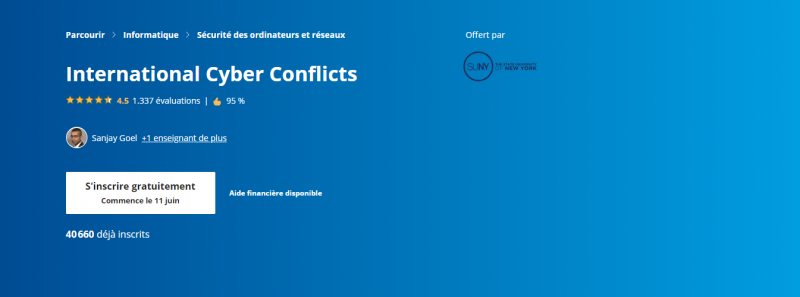
coursera.org 
coursera.org -
On July 6, 2013, three persons were killed when an Asiana Airlines plane from Seoul, Korea, crashed into San Francisco International Airport (SFO). The National Transportation Safety Board (NTSB) of the United States determined that the flight crew's (in)actions were most likely to blame for the disaster. Two adolescent girls died in the plane crash, while the third was killed after she was hit by a firetruck.
Accidents are frequently caused by the human component. According to the NTSB and others, pilot error is responsible for more than half of all aviation disasters (and for road accidents, it is even 90 per cent). These mistakes can be avoided by properly building safety and security systems. After successfully completing this course, you will be able to design secure embedded systems that are at the heart of these safety and security essential systems. In our capstone project, you'll even have to develop your own landing guidance system. This specialty is for you if you want to design safe embedded systems for the benefit of humanity.
EIT Digital has selected three MOOC subjects of industrial interest: 1) embedded design and hardware, 2) embedded connectivity security, and 3) real-time systems. These MOOCs demonstrate what it takes to program IoT systems. We concentrate on technologies utilized in the current IoT business, and we advocate for a hands-on learn-by-programming strategy in which you are exposed to real-world development from the start.This course offers:
- Shareable certificate: Get a Certificate when you complete
- 100% online courses
- Planning flexible
- Intermediate level
- Approximately 5 months to complete (Recommended pace of 4 hours/week)
- Subtitles: English, Arabic, French, Portuguese (European), Italian, Vietnamese, German, Russian, Spanish
Rating: 4.4/5
Enroll here: https://www.coursera.org/specializations/embedded-systems-security
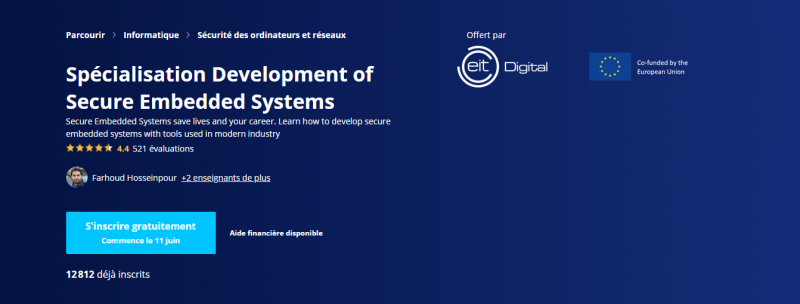
coursera.org 
coursera.org





























